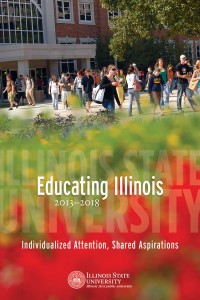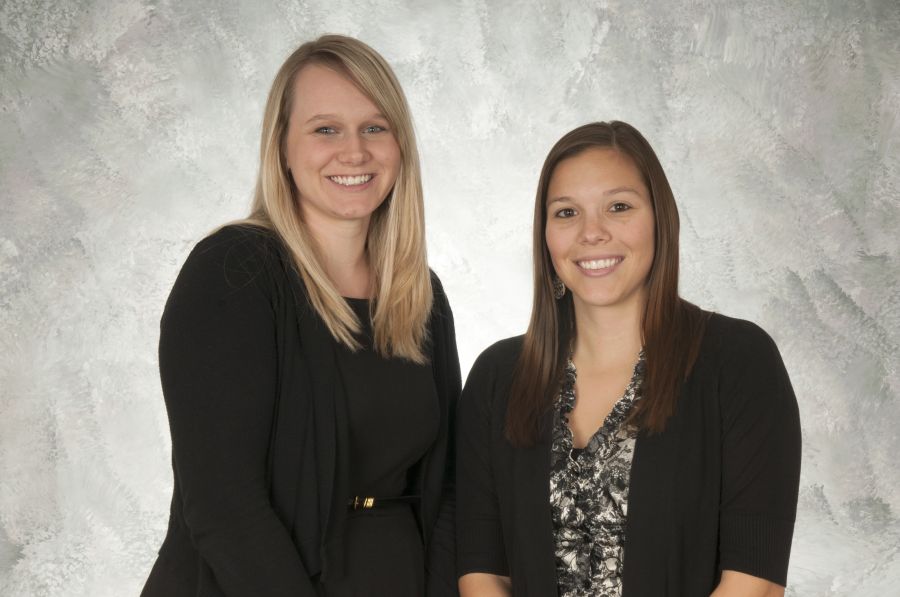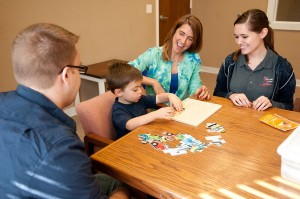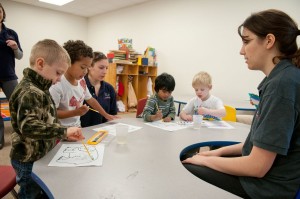Illinois State University’s The Autism Place (TAP) offers services to children with Autism Spectrum Disorder (ASD) and their families while acting as a training facility for undergraduate and graduate students.
With the guidance of Professor Karla Doepke students learn to help clients gain valuable socialization, learning, and communication skills. The Autism Program ISU Affiliate receives funding from The Autism Program of Illinois, which is grant-funded through the Illinois Department of Human Services.
The latest iteration of Illinois State’s strategic plan, Educating Illinois 2013-2018: Individualized Attention, Shared Aspirations (goal 1, strategy 3), aims to ensure that students have unparalleled learning experiences. The plan charges university leaders to “increase opportunities for students to engage in high-quality, high impact educational experiences.”
Fourth-year school psychology doctoral students Nicole Moore and Alyssa Sondalle serve as student directors for TAP. In the position they oversee client intakes, graduate clinician student supervision, service coordination, social skills group coordination, and outcome evaluation. Moore and Sondalle shared how their experience leading TAP has enhanced their time at Illinois State.

Educating Illinois in action: Read more about how Illinois State’s strategic plan is being implemented: EducatingIllinois.IllinoisState.edu.
How did you get involved with TAP?
AS: We have both had a wide range of great experiences here. I started at TAP my first year of graduate school, assisting an advanced clinician lead a social skills group. Starting my second year I became a leader of a social skills group for elementary-aged children and began working with individual clients. These have all been great experiences and I have really enjoyed working with groups of children, individual children, as well as having the opportunity to work with their families.
NM: I started at TAP as an undergraduate student, working with individual clients and assisting in an early childhood program, Sprouts. I continued working at TAP in my first year of graduate training, as a TAP staff member. Through this experience, I was asked to lead a new group—the Buddies social skills group working specifically with young kids who had just graduated from Sprouts. Also, along with another clinician I provided consultation in the Unit 5 school district working with paraprofessionals. We provided trainings during teacher-in-services and also assisted in the classroom. This was a great experience as we were able to work collaboratively to provide effective interventions to children with autism.
What made you want to take a leadership role?
AS: I really enjoyed the experiences I obtained in my first two years with assisting in and leading social skills groups and working with individual clients. I knew I wanted to continue to work with children with autism and their families. There are opportunities to become a staff member here at TAP, and in my third year, I became a staff member. During this time, I started helping out with coordination of social group activities and continued to work with group and individual clients. I was eager to continue to take on roles and get further experiences and have been able to do so, which have all been great opportunities and allowed me to work with many children and their families in different contexts.
NM: I knew I wanted to go to a graduate training program that had an autism focus. I started working at TAP during my first year and continued for all four years of the program as a TAP staff member. In this time I was able to gain opportunities working with clients, families and leading teams of undergraduate students. In my third year, I took on a leadership role as the Sprouts Program coordinator (program for early childhood clients). In that role, I led a team of undergraduates and graduate students for the program and served as parent liaison. Most recently, Alyssa and I work as intake coordinators, supervise practicum students, and provide on-site supervision during nightly social skills groups.
Is there any resistance by parents to working with students?
NM: We feel that we have collaborative relationships with the families. We are open and honest with the families, and let them know that this site is a training facility that is run by undergraduate and graduate students. We try to be empathetic—they know their child better than anyone else—and we want to work in collaboration with them and help them with any concerns they might be having and offer techniques and services.
How do you get support in your leadership roles?
AS: We are supported by Dr. (Karla) Doepke, and she is always extremely supportive of everyone and all activities at TAP. There are other faculty members who are familiar with TAP, so we are also able to receive support from them. Additionally, there is a Friends of TAP network, comprised of parents and community members, that helps support TAP through fundraising. As clinicians, we are also very supportive of one another and are always thinking of new ideas that we share and we problem-solve together.
What is most challenging in the experience?
NM: We really enjoy the experiences we have gained at TAP. A challenging part of our roles is when we receive phone calls from families who are looking for services, and sometimes they are placed on our wait list, if we do not have the resources to serve them at the time. That is pretty difficult, so we try to get creative in ways how we can best serve as many families as possible, though we focus on providing a high quality of service, not just quantity.
AS: It can definitely be challenging when we are not able to serve all of the families who are interested in our services. We try to get the word out that there are more services needed in the community.
What do you see as the value of being able to take on a role like this as a student?
NM: We’ve gotten a lot of great experiences here that we may not have at other sites. We are provided opportunities to work with children and adolescents and their families, collaborate with other professionals, and gain leadership and supervisory roles.
AS: It is a unique advantage to have a clinic like this at Illinois State University. I didn’t have as much experience working with children with autism prior to coming to graduate school. I am thankful for these experiences and it is now a career goal of mine to continue working with children with autism and their families.




You go girls!
Great job! As a parent of a high functioning child of ASD, you realize how important early childhood/early intervention can be when they are so little. I am so thankful for my son’s teachers and kudos for you two and I look forward to hearing more about TAPS.